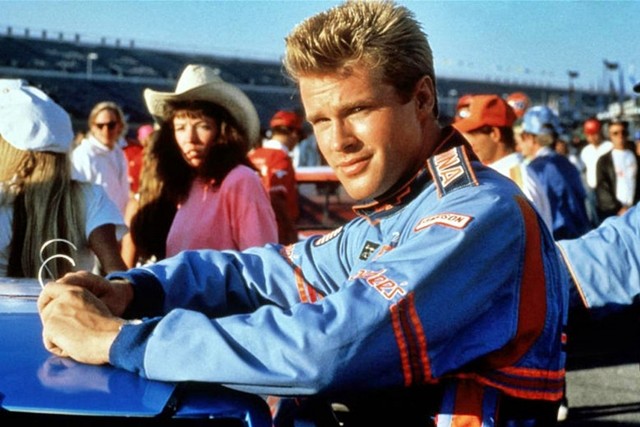
By Jae-Ha Kim
Chicago Sun-Times
July 6, 1990
After making a name for himself in roles set in the past, Cary Elwes is driving his career into the fast lane with his latest film, “Days of Thunder,” now playing at local theaters.
Playing race car driver Russ Wheeler, Elwes stars opposite Tom Cruise in the movie.
“I knew about this movie even before the wheels were in motion, and I went after it,” Elwes said. “I knew it was going to be a quality picture, with Tom Cruise acting, Don Simpson and Jerry Bruckheimer producing and Tony Scott directing. They made me sit up and take notice.”
The role is a coup for the English-born actor. Cruise’s box office draw ensures that people who’ve never heard of Elwes will see him.
“They’re supposed to be part of the same team,” he said in a phone conversation from Los Angeles. “But they end up setting the team aside and putting their personal goals at stake.”
His character is a part that is less sympathetic than many of his previous roles. He is Cruise’s chief competitor on the race car circuit. Even fans of the 27-year-old actor probably will do a double take when Elwes appears on screen, sporting a buzz cut and aviator sunglasses. He looks harder and tougher in this movie than he did in any of his previous films.
He has the ice-blond good looks of a matinee idol, but Elwes’ ability to totally transform himself into the character he plays is what has made him one of today’s most outstanding young actors. While many of his peers are guilty of accepting roles that don’t stretch them as artists, Elwes has taken risks throughout his career.
In his first major hit movie, “The Princess Bride,” Elwes played a simple farmboy who was as dashingly handsome as he was awkward and funny. He portrayed Matthew Broderick’s good-natured
second-in-command in last year’s “Glory.” As Lady Jane Grey’s teenage husband in “Lady Jane,” Elwes expertly exuded the insolence and confusion of a high-born adolescent. And in his cinematic debut seven years ago in “Another Country,” Elwes skillfully played the innocent lover of another male student without resorting to practiced mannerisms.
One reason Elwes seems so natural on the screen is because he prepares intensely for every role. For “Days of Thunder,” he had to rely on practical research to meet the physical demands of playing a race car driver. For Cruise, who has been competing for several years in professional car races alongside his friend and “Color of Money” co-star, Paul Newman, this was no problem.
Elwes already has wrapped up shooting his next film, which should be released later this fall. He co-stars with Bridget Fonda and Christopher Penn in “Leather Jackets,” which he describes as an urban Western with a great deal of black humor. This marks his first role as a down and out villain, a part he was eager to tackle.
“I’ll tell you something right now,” he said. “There’s a myth about actors saying, `Oh no, that’s not me on screen at all. I’m just acting.’ OK, if I were to say to you that’s not me, that’s fine. And I would tell you that I don’t behave like (a villain) everyday, and that’s true, I don’t. But to say there’s absolutely none of me in there is ridiculous, because it’s me playing the part, you know?
“I wanted to do it because I figured if I kept a part like that inside me too long, I might explode. Dobbs, the guy I play, is amoral and not the kind of man you want to know. But he seduces you into almost thinking he’s a good thing. You meet him and think, `Hey, he’s cool.’ The scary thing is there are people out there like that in real life.”
With the exception of a couple mediocre films early in his career, Elwes successfully has managed to escape both exploitative movies and pigeonholing, a feat not so easy to do in Hollywood.
“People ask me how I’ve been able to avoid cheesy movies, and it’s quite simple,” Elwes said. “I hate exploitation. I know that some people obviously don’t, because otherwise those kinds of movies wouldn’t exist. But they’re no friends of mine. As long as I’ve got a little food on the table, I see no need to take on work purely for money or the sake of working. Nothing’s worth it if you don’t derive some sort of satisfaction after a day’s work.”